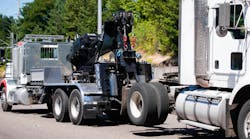The mandatory use of electronic onboard recorders (EOBRs) to ensure compliance with trucker hours-of-service (HOS) rules is clearly stated in the 90-pg. white paper Rep. James L. Oberstar (D-MN), chairman of the House Committee on Transportation and Infrastructure has issued to blueprint his vision for the Surface Transportation Authorization Act of 2009 as a bill written to deliver “investment and reform” to our nation’s transportation system.
The paper declares that the act would improve commercial driver safety by prescribing regulations to require all commercial motor vehicles subject to HOS be equipped with EOBRs. The argument for this need is tied in part to the 2007 proposed rule issued by the Federal Motor Carrier Safety Administration (FMCSA) to only require EOBRs by companies with a pattern of HOS violations. “The vast majority of motor carriers – more than 99% – would have been able to continue to use paper logbooks under the rule, which has not been finalized,” noted the House committee.
Other safety-related actions the bill would require of FMCSA include:
- Establish a clearinghouse of positive drug and alcohol test results and refusals to test by commercial drivers and provide enforcement and penalty authority over service agents, including Medical Review Officers and collection facilities
- Prohibit employers from allowing an individual to drive or perform another safety-sensitive function until the employer verifies the individual has not violated the rules of the drug and alcohol testing program through a check of the clearinghouse
- Require, within two years, to prescribe regulations to establish minimum training requirements, including behind-the-wheel instruction, for commercial motor vehicle drivers prior to their obtaining a CDL
- Require establishment of a National Registry of Medical Examiners within one year and require medical examiners seeking to be included on the registry to complete specific courses and training and pass an examination
According to the white paper, along with many other requirements, the act will direct that a “new core apportioned Freight Improvement Program (FIP) be established” to accomplish these objectives:
- Establish a dedicated source of funding for freight-related highway projects and provideStates with “formula funding for projects that will improve freight mobility on the National Highway System and secondary freight routes.”
- Require each State to develop a freight plan that comprehensively describes the State’s current and long-range freight planning activities and investments, and direct each State to establish a freight advisory committee, with broad public and private membership, to advise the State on freight issues and aid “in the development of the State’s freight plan.”
- Mandate that DOT establish “standardized quantifiable performance measures” regarding the speed and reliability of freight movement and to work with States to set State-specific targets in relation to each measure and requires each State to submit to DOT and publish annually a report documenting its progress toward meeting its performance targets.
- Require States to inventory and assess the condition of secondary freight routes
The authorization bill will replace the current authorization, SAFETEA-LU, which is due to expire on September 30. According to a report by The Wall Street Journal, while the Senate has introduced s a similar bill, Oberstar hopes to bring his committee’s $450-billion, six-year transportation spending bill to the House floor for a vote first-- before Congress breaks for its August recess.



